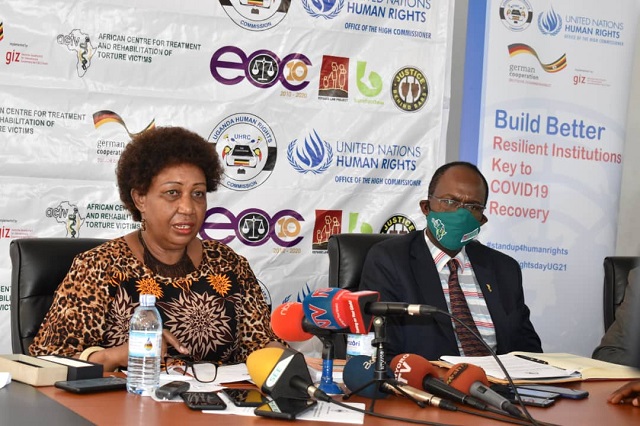
Kampala, Uganda | THE INDEPENDENT | Health rights activists have blasted Uganda Human Rights Commission-UHRC for downplaying the right of Ugandans to reject vaccination. It comes a day after the Commission chairperson, Mariam Wangadya, said that Ugandans have no right to reject the ongoing COVID-19 vaccination exercise during a press conference ahead of the International Human Rights Day held annually on December 10, 2021.
According to health activists, Wangadya’s statement has no basis in the law and that any effort to promote vaccination should follow proper laws locally and internationally. Moses Mulumba, the head of the Center for Health, Human Rights and Development (CEHURD), says that Uganda Human Rights Commission should understand that they can only operate within the law.
He referred to the Immunization Act, 2017, which gives the minister of health powers to issue a statutory instrument to provide for vaccination in extraordinary cases. The minister can also determine if the vaccination is mandatory or not. Mulumba says since the minister has not issued such an instrument, it is incorrect for the Commission to say that Ugandans cannot reject vaccination.
Although the commission is mandated to guide the government on human rights issues, Mulumba says that if the government followed them on that, they would risk being sued by Ugandans forced to take the vaccine without following the law.
Mable Kukunda from the Uganda National Health Consumer’s/ users’ Organization also says that UHRC is wrong to say that Ugandans cannot reject vaccination. She says Uganda should only enforce existing laws and in the event that there is no law making it mandatory to take the COVID-19 jab, people’s rights should be respected.
Kukunda says that consent is important especially since many of the vaccines on the market are still in trial stages, adding that it is partly why the World Health Organization guides that people consent to vaccination by filling consent forms.
Kukunda says that the government should have an instrument in place if they are to make COVID-19 vaccination mandatory. However, most important to her, Kukunda wants the government to enhance sensitization efforts to have the public embrace vaccination.
She says there are various anti-vaccination campaigns marred with myths that discourage people from taking the COVID-19 jab. There are myths in the public domain that vaccination is a depopulation campaign by the whites. Kukunda says the public should be educated on the importance of taking the jab to counter the falsehoods disseminated by anti-vaxxers.
Kukunda says that the government should also address issues of side effects. She called for a study into how people react when they take the jab. Last week, the Health Ministe, Jane Ruth Aceng told a committee of Parliament that the Ministry was working on an instrument to make COVID-19 vaccination and some other measures to curb the virus mandatory.
******
URN
 The Independent Uganda: You get the Truth we Pay the Price
The Independent Uganda: You get the Truth we Pay the Price


